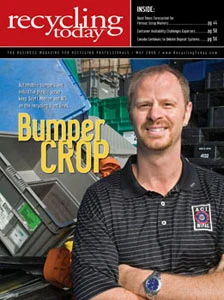The slowdown in the U.S. economy has led to the generation of less post-industrial plastic scrap for reprocessors.
"Things suck," a reprocessor based in the Midwest says, noting that manufacturers are not generating much in the way of scrap material.
"The auto industry is the worst," he says. However, it is not the only sector that has been affected by the cooling U.S. economy. "It’s widespread," he says, noting that medical molders appear to be faring a bit better than other manufacturers.
A reprocessor based in the Southeast who specializes in high-molecular-weight plastics has also seen a decrease in post-industrial generation, though he describes the decline as "slight."
He also notes that many manufacturers are trying to reuse more of their own scrap material directly. "In some cases it is clean enough that they can regrind it and put it back into their applications," he says.
Demand for scrap plastics remains healthy, despite the decrease in manufacturing. "Demand is excellent," the reprocessor based in the Southeast says. He adds that sales at his company are up 30 percent compared to 2007, though he credits the increase in part to a recent facility expansion.
"If you can find material, you can sell it," the Midwestern reprocessor says.
Plastics reclaimers are benefiting from rising oil prices as well as from the green movement, the reprocessor based in the Southeast says. He notes that his company is performing more color sorting of material to expand the number of consumers that can use recycled content material.
"Quality means something," he says. "If you do a good job of recycling, people bang your door down to get more [material]. If they have trouble with it, you’ll have problems."
The Southeastern reprocessor predicts, "It is going to be a fairly robust spring for recyclers."
He adds that the true test for the secondary plastics industry will come in the summer months. "If we can stay busy then, we’ll be OK."
When it comes to consumers of secondary plastics, at least one manufacturer is seeing indications of a brighter future.
According to a report in Business Week, Trex, the Winchester, Va.-based company that makes composite decking material using LDPE (low-density polyethylene) film in the form of single-use plastic bags, has seen a boost in its share price, advancing 23 percent since March 17.
"Virgin prices have been going up; however, Trex has been able to maintain pricing" for recycled plastics, a company executive said during an earnings call in February. "We are able to maintain and even essentially reduce our cost."
Also reduced is container availability for exporters of secondary plastics. "Forty-five-foot containers for scrap plastics are things of the past," the Midwestern reprocessor says. He says he tries to be more creative when sourcing containers as a result.
"As the U.S. dollar gets stronger and people aren’t coming here for a garage sale, we’ll have less export, and more containers will be available," the Midwestern reprocessor says.
(Additional news about plastics recycling markets is available online at www.RecyclingToday.com.)

Explore the May 2008 Issue
Check out more from this issue and find your next story to read.
Latest from Recycling Today
- Nucor receives West Virginia funding assist
- Ferrous market ends 2024 in familiar rut
- Aqua Metals secures $1.5M loan, reports operational strides
- AF&PA urges veto of NY bill
- Aluminum Association includes recycling among 2025 policy priorities
- AISI applauds waterways spending bill
- Lux Research questions hydrogen’s transportation role
- Sonoco selling thermoformed, flexible packaging business to Toppan for $1.8B





